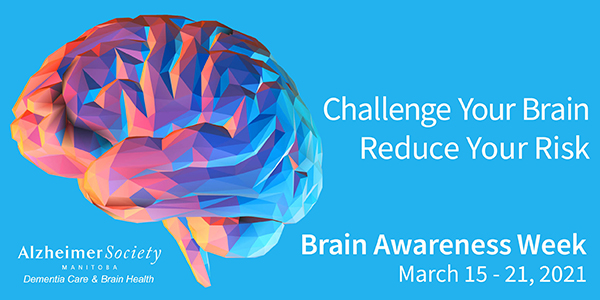In This Issue
Brain Awareness Week is March 15 to 21
Personal Story: The Unique Challenges of Young Onset Dementia
Research: The Dangers of Prediabetes
Keep Diabetes at Bay
Don’t Miss Your Chance to Chase the Ace!
Virtual Minds in Motion® Program: Spring Session
Virtual Spring Programs and Support Groups
An Interview with Viggo Mortensen
THANKS FOR YOUR FEEDBACK on our eNewsletter!
Take Action for a Healthy Brain !
The Alzheimer Society celebrates Brain Awareness Week from March 15 to 21 to encourage people to challenge their brains and reduce the risk of dementia.
Click here to find out about some of the ways you can keep your brain healthy, including:
- Challenging Your Brain
- Being Socially Active
- Making Healthy Food Choices
- Keeping Physically Active
- Reducing Stress
- Protecting Your Head
By making healthy lifestyle choices, you may be able to reduce your risk and improve your brain’s ability to sustain long-term health.
Follow us on Facebook, Twitter and Instagram! Throughout Brain Awareness Week, we will be posting tips for things you can do for brain health.
A Daughter’s Story:
The Unique Challenges of Young Onset Dementia
As a young mom, Jenelle Fender would buckle her kids into their car seats. Then she’d turn to her own mother, Susan, and buckle her in, too.
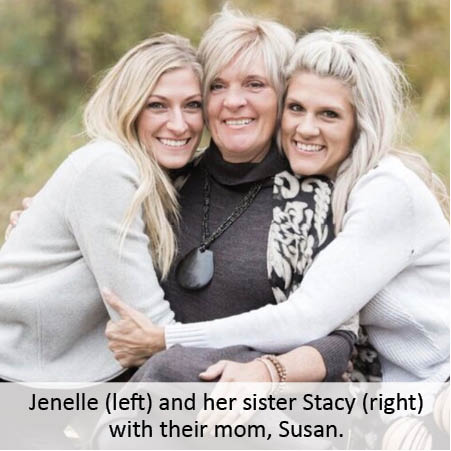
Susan has young onset dementia.
“While I had young children, I did a lot of the same things for Mom as I did for the kids,” says Jenelle. “No one at age 35 expects to have to do that.”
Jenelle’s children are older now, and they’re beginning to help their Nana. But still, it isn’t easy. “It’s tough to see your mom, who is physically well, be held back from so much due to their cognitive impairment,” she says of Susan, who received her diagnosis in 2017 at the age of 55.
Jenelle says Susan changes a bit more every day. Even so, she and her sister, Stacy, make a point to share with her the parts of their lives they know their mom would have cared about. “I remember a time when she had words and wisdom to share, always caring and compassionate,” says Jenelle. “Now we rely on facial expressions, smiles and touch.”
While the symptoms of dementia and young onset dementia (also known as early onset dementia) can be similar, the latter is the term used when the disease begins before the age of 65. As in Susan’s case, it can affect people who are still in their forties and fifties.
Young onset dementia comes with unique challenges. For example, at the time of diagnosis, people are often physically strong and active. If they are still in the work force, they may have to resign from their jobs, losing their income. Many also have a myriad of family responsibilities, which could include looking after young children and elderly parents.
Jenelle’s mom and dad were faced with some of these difficulties, and they also had to set aside plans for retirement. Jenelle could see that her mom’s diagnosis was tough on her dad, Jeff. She sums it up this way: “You dream with your spouse about life after retirement and the travelling you’ll do. But all that is lost.”
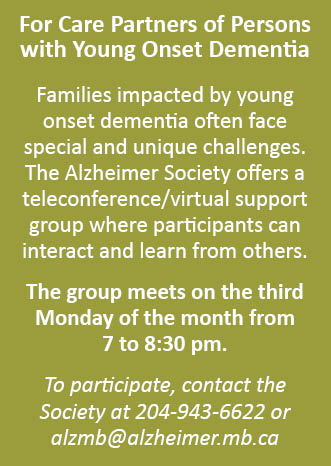 Reaching Out for Help
Reaching Out for Help
The family reached out for help from the Alzheimer Society, which included attending online classes and accessing the website as an information tool. Jenelle says they were grateful to find resources available in their area of the province.
As the family’s journey continues, there are times of joy. Her mom dances “without a care,” and Jenelle is often amazed at how her dad can guide her mom to laughter.
Susan’s young onset dementia has left Jenelle and Stacy with the sense that they’re missing out on the time they would have had with their mom. Still, says Jenelle, she cherishes the time they can spend together.
“I love it when I get to see the smile on her face, and those moments of clarity when it feels like her again. Those moments when she can put three words together are celebrated. We need to be present and slow down to see the beauty within the journey.”
Research Delves into the Dangers of Prediabetes

Research has shown that people with diabetes are more likely to develop Alzheimer’s disease. Now, a study coming out of the United Kingdom reveals that those with symptoms of prediabetes are at higher risk for vascular dementia and cognitive decline.
In this wide-reaching study, investigators from the University College of London tapped into almost 450,000 participants in the UK Biobank. The Biobank is a large-scale biomedical database and research resource containing medical information from 500,000 individuals in the United Kingdom.
At recruitment, participants aged 40 to 69 were tested for blood sugar levels over the previous two to three months. According to test results, they were divided into five categories based on their blood sugar levels: low-normal, normal, prediabetes, undiagnosed diabetes and diabetes.
The researchers also collected data from other assessments, such as tests of visual memory and MRI brain scans, to determine whether or not participants had cognitive decline and dementia, including the type of dementia.
The results, from analysis that included longitudinal and cross-sectional methods, indicated that people with higher than normal blood sugar levels were more likely, over an average of four years, to show cognitive decline (42% of those with prediabetes and 39% of those with diabetes).
Examined over an average of eight years, those with prediabetes had a higher likelihood of developing vascular dementia (but not Alzheimer’s disease). The results were even more concerning for those with diabetes: compared to those with normal blood sugar levels, these individuals were three times more likely to develop vascular dementia, and they also had a higher risk of developing Alzheimer’s disease.
Other results from this study reveal that those with prediabetes blood sugar levels were more likely to have a smaller hippocampus – a part of the brain with a major role in learning and memory. Having prediabetes was also strongly associated with the presence of lesions on the brain. Both are linked to age-related cognitive impairment.
This study shows the association of prediabetes and diabetes with the risk of dementia. By maintaining normal blood sugar levels, people may be able to lower their risk of this disease. Click here to read some tips about some things you can do to maintain brain health.
Tips for Brain Health: Keep Diabetes at Bay!

In this issue’s research article, we learned that having high blood sugar levels – even those associated with prediabetes – is a risk factor for dementia and cognitive decline. While we’ve long known that having diabetes is linked to dementia, we now know that some people may be at risk even before being diagnosed as diabetic.
To help maintain normal blood sugar levels – and in honour of Brain Awareness Week (March 15 to 21) – here are some tips to reduce the risk of diabetes or help manage this disease:
Eat a Healthy, Balanced Diet
Choose foods lower in fat and calories and higher in fiber. Focus on fruits, vegetables and whole grains. Strive for variety to prevent boredom.
Be More Physically Active
Aim for about 30 minutes of moderate aerobic activity on most days of the week, or at least 150 minutes of moderate aerobic activity a week.
Maintain a Healthy Weight
To keep your weight in a healthy range, focus on permanent changes to your eating and exercise habits. Motivate yourself by remembering the benefits of losing weight, such as a healthier heart, more energy and improved self-esteem.
Talk to Your Health Care Provider
Talk to your doctor and other health care providers about your current health status and lifestyle; work together to identify the optimal strategy to prevent diabetes or manage it, with the aim of enhancing your overall well-being.
When Medications Become an Option
If your doctor has prescribed medication, it is important to follow the treatment plan to receive optimum benefits and to continue a healthy diet/exercise regimen.
Don’t Miss Your Chance to Chase the Ace!
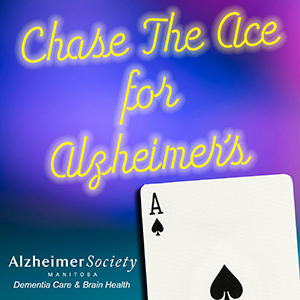
Coming Soon!
Our first-ever online Chase the Ace game where everyone who plays has two chances to win!
1. Weekly draw worth 20% of each week’s sales
2. Accumulator jackpot worth 30% of all sales until the Ace is found
The remaining 50% of all sales will go towards helping Manitobans living with dementia!
Keep an eye out for the launch date!
Register Now for our Spring Virtual Minds in Motion® Program!

Dates for the spring session of our Minds in Motion program are confirmed! This popular program connects people living with early to moderate signs of dementia and their care partners through fitness, fun and friendship.
The virtual version of Minds in Motion takes place on a ZOOM link for 1 hour and 30 minutes. It offers six weekly sessions that include a gentle chair fitness class followed by socially engaging activity and conversation. Click here to find out how participants are enjoying the online format.
Spring Session Dates and Times
Tuesdays, March 9 to April 13, 2 to 3:30 pm – SOLD OUT!
Thursdays, March 11 to April 15, 10 to 11:30 am
Tuesdays, April 27 to June 1, 2 to 3:30 pm
Thursdays, April 29 to June 3, 10 to 11:30 am
Register now to stay active, engaged and connected!
Check Out Our Virtual Spring Programs and Support Groups!

The Alzheimer Society is offering virtual programs and support groups in the spring season, and there’s something for everyone! Here’s the best part – you can participate from the comfort of your own home, no matter where you live. All you need is a computer and a Wi-Fi connection!
Online Education Sessions
Our online education sessions cover a wide range of topics – from medication safety to aphasia and dementia to the progression of dementia. The sessions are geared towards helping people with dementia and their caregivers be confident on their dementia journey. Click here for more information and to register.
Virtual Support Groups
For Care Partners: A variety of days and times are available for those interested in joining a virtual support group for care partners. These groups help connect people with others living in a similar situation during these uncertain times. Click here to register for a date and time that suits your schedule.
For People with Dementia: We are holding virtual support groups to ensure continued access to support and information during the pandemic. These weekly/bi-weekly groups for people with dementia provide participants an opportunity to:
- Learn about living with dementia and its progression.
- Share feelings and common experiences.
- Exchange practical coping strategies.
- Participate in discussions.
For more information about current and upcoming support group opportunities, please contact:
Sarah Dueck
Client Support Coordinator
204-943-6622 ext. 213
[email protected]
Remember: You are not Alone.
We are here to help you and your family through these difficult times. You can reach a comforting ear by phone or get a quick response by email. Call us at 204-943-6622 (Winnipeg), 1-800-378-6699 (toll free in Manitoba) or email [email protected]
The Alzheimer Society Talks with Viggo Mortensen About New Film
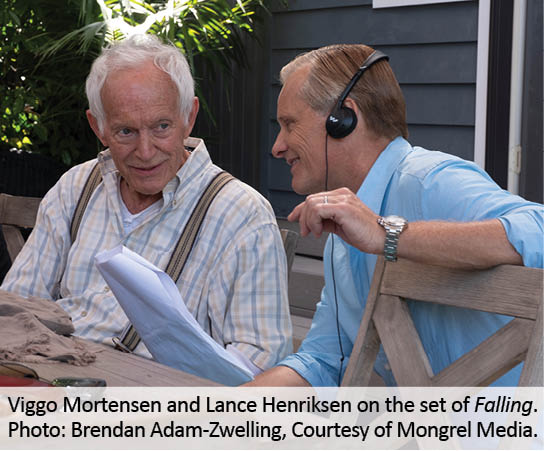
A representative of the Alzheimer Society of Canada recently had the privilege of interviewing acclaimed actor, Viggo Mortensen. Dr. Saskia Sivananthan, Chief Science Officer at ASC, spoke with Mortensen about his new film, Falling, which he wrote, directed and starred in.
For the movie, Mortensen drew on his personal caregiving experiences to depict the true-to-life challenges facing people and families living with dementia. Both of his parents, his step-father and aunts and uncles on both side of his family had the disease.
In the interview, Mortensen stressed the importance of providing an accurate portrayal of dementia on screen – one that shows compassion and understanding when communicating with a person living with the disease.
His belief is that caregivers must be flexible with the person they are caring for. “Your attitude should be about serving them,” he says.
Falling is one of three new movies that reflect dementia, the other two being The Cuban and The Father. Alzheimer Society of Manitoba’s Program Director, Erin Crawford, is happy to see the topic of dementia being addressed in mainstream media.
“While our role is not to endorse any particular movie, it is heartening to know that dementia is being portrayed on screen,” she says. “Reflections of the various realities of dementia go a long way to fight the stigma connected to the disease.”
Click here to watch Dr. Sivananthan’s interview with Mortensen.
We Appreciate Your Feedback on our eNewsletter!

The Alzheimer Society of Manitoba wants to continue providing you with relevant, educational and helpful information about Alzheimer’s disease and other dementias in this monthly eNewsletter. To find out if we are hitting the mark, we conducted a survey in our January and February 2021 editions. Respondents took the time to answer the 24 survey questions.
First, a big THANK YOU to all who responded!
Second, we’d like to share some of the positive feedback we received. Here are a few highlights:
- An overwhelming majority of respondents agree that our eNewsletters offer interesting and relevant topics and are easy to read.
- Over 80% think the caregiver information is practical and useful.
- Personal stories about Manitobans affected by dementia is an important part of the eNewsletter for 90% of our readers.
- Almost 95% think it’s important to include stories and information about current dementia research topics.
- When asked how they would rate the overall value of the eNews, 100% of respondents were either “very satisfied” or “satisfied.” (We sure like that finding!)
In an open-ended question, respondents were asked for input regarding what they would like to see covered, and lots of good ideas were presented for us to consider. These include such topics as tools to support living at home longer, a request for more information about workshops taking place in rural areas, and a desire to see stories about end of life. In the “Additional Feedback” section, comments were positive, such as: “It’s easy to read and the stories are helpful,” “There are many uplifting suggestions” and “It is very informative and covers a good range of topics.”
We take all of your feedback seriously, and we pledge to continue to provide high quality, useful information. We will delve into your ideas, so watch for future articles that will reflect the interests of our readers!
At any time, readers are welcome to contribute story suggestions by sending an email to: [email protected]

